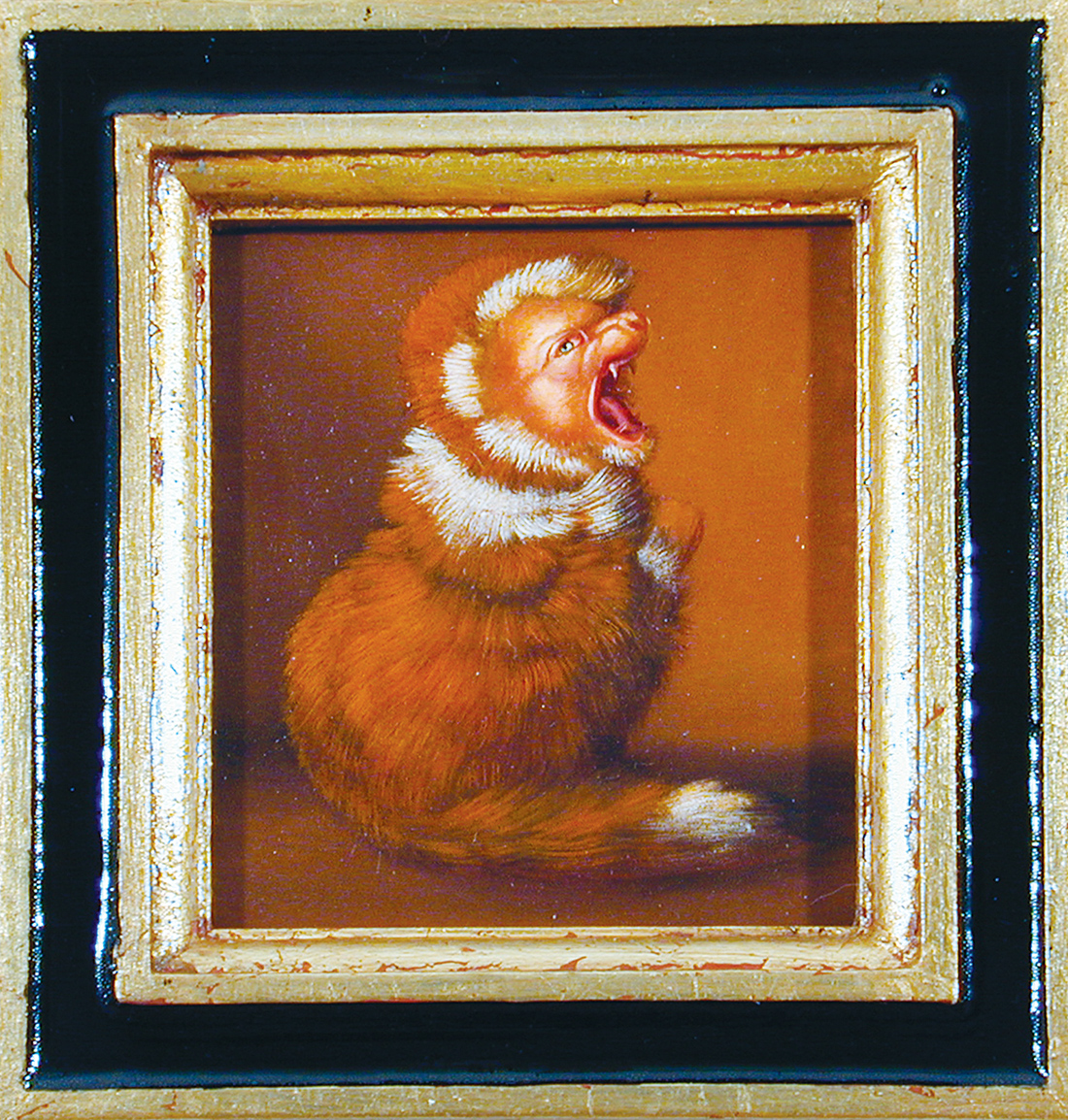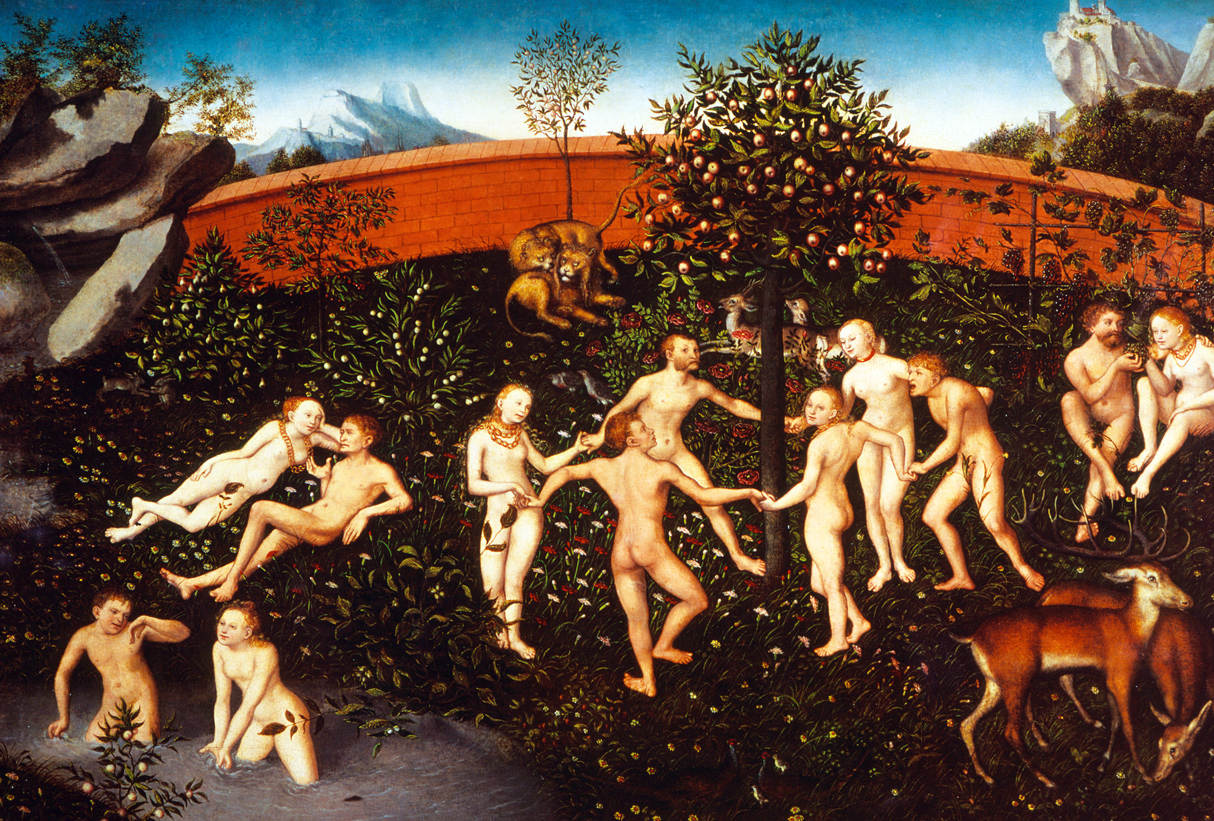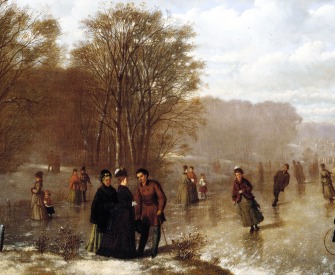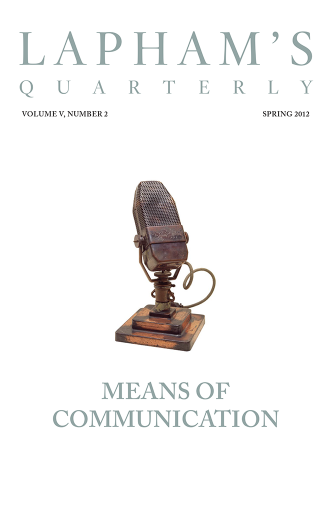Men argue, nature acts.
—Voltaire, 1764And Such Small Deer
A writer struggles to defend his trees from a pack of hungry deer—“an episode of great vexation and buffoonery.”
By Garret Keizer

Deer in the Forest, by Gustave Courbet, 1868. Minneapolis Institute of Arts, Minneapolis, Minnesota.
Santiago
About a dozen years ago my wife and I planted a hedge of twenty-seven arbor vitae trees along the border of our backyard, which, although our house sits on nineteen acres of fields and woods, is also the back border of our property. A sloping hayfield with a realtor’s dream of panoramic views lies directly behind us, so the hedge was our attempt to secure privacy for the future. The nurseryman who sold us the shrubs assured us they were the best species for our purpose and climate. I measured and marked the planting sites, called in “Chink” Norris (whose possibly racist nickname I’ve not looked into any more than I have the nurseryman’s credentials) to come with his small backhoe and dig the holes. As advised, I faithfully watered and fertilized each tree throughout the first year, with results that were everything I’d been promised: dense, hardy, and luxuriant, a towering bulwark of green.
Thus began an episode of great vexation and buffoonery in my life, known and (I have no doubt) merrily recounted in local circles as the tale of “Garret and his trees,” or as my wife puts it, “Garret and the deer.” It so happens that we live next to one of the county’s most extensive “deer yards,” those areas of canopied woods to which the deer retire in winter, making networks of deeply furrowed tracks and foraging as best they can until there’s a declared winner in the yearly foot-race between spring and starvation.
It also happens that deer find arbor vitae a delicacy, related to the cedar that they also love, but thicker and more succulent. By the second winter they’d found and attacked my trees. I fought back, not with a vengeance—I stopped short of that—but with something close to obsession. I erected fence structures that made our backyard look like a scene from the Somme. I played recordings of wolves howling, recordings of me howling. I fired pistol shots at random hours of the night. I hung or sprinkled repellents of blood meal, urine (mine), and deodorant soap. Hearing that deer were repelled by the scent of human hair, I asked some hairdressers to set aside their sweepings in a bag with, as the saying goes, my name on it.

Dutch Master: Lord A.O.L. Time Warner, by Laurie Hogin, 2003. Courtesy the artist and Littlejohn Contemporary, NY.
Joan Didion once wrote, commenting on a folk remedy for hysterical distress, that it is difficult to feel like Catherine Earnshaw in Wuthering Heights with your head in a Food Fair bag. It is also difficult to imagine you are Santiago in The Old Man and the Sea when you’re stuffing sachets of cut-up pantyhose with human hair. But often I thought of the old fisherman, whacking the sharks with his club as his labor and his dream were devoured in front of his eyes.
As any game warden will tell you, if deer are hungry enough they will get through anything, which this year included an electric fence hooked to a charger supposedly powerful enough to deter elephants. So the farmer who’d helped me rig it up assured me. What he did not tell me, because he did not know, was that the insulating snowpack would prevent an animal from completing the circuit with the ground. In came the deer like a school of piranhas. This was shortly after a man from Connecticut purchased the hayfield behind our house for a price few of my neighbors could have afforded and none of them could believe and set about measuring the foundations of a house.
Gatsby
Nature teaches us economy and art, tenacity and grace, but all by analogy to itself. “Eyes front, please,” it says, tapping the blackboard with its teeth and claws. What it gives us for homework, though, is futility.
“Boats against the current, borne back ceaselessly into the past” is how Fitzgerald puts it in The Great Gatsby. Only an American would be so naïve as to think he is talking solely about an American dream. It is American only insofar as America retains the memory of contact with a wilderness that invites dreams but makes no covenant with them. The boat borne back into the past is, in its most elemental form, the corn bitten back to the stalk. The wheat beaten down by the hail. As soon as Jonah sits down under a gourd vine, a worm starts eating his shade. Earlier a whale had tried eating him.
We sense the same futility in history. The enduring cliché that history repeats itself implies a comparison to the cyclical patterns of nature. Writing in 1933 about the rising fascist movements, Leon Trotsky said, “Today, not only in peasant homes but also in city skyscrapers, there lives alongside of the twentieth century the tenth or the thirteenth.” At the same time as the deer were devastating my hedge, President George W. Bush vetoed a bill that would have outlawed waterboarding. Torquemada redux. At our town meeting last March an angry electorate defeated a bare bones school budget for the first time in a dozen years. People said derogatory things about teachers, about children receiving special education, that I had not heard in more than twenty years. The telemarketers I’d driven back over the borders of our dinner hour resumed their evening raids. Like weeds and whiskers, everything grows back. And what you want to grow—the saplings, the school music program, some notion of a humanistic civilization—is eaten down to the root.
Several years ago I spotted two farmers squatting at the top of the hayfield behind our house, looking intently at the ground. I wondered if they had driven the baler over a rabbit or a snake. Instead, they were puzzling over the first traces of a rare infestation of army worms, so called because they advance in a line. A freak in the weather had called them out like Huns onto the steppes. They ate the hayfield from top to bottom, they ate our back and front lawns. They crossed the road, in such numbers that cars were sliding in the black and green gore of their bodies, and proceeded to eat the pastures beyond.
All is vanity, said Ecclesiastes. He planted vineyards, gardens, and fruit trees but decided that all was vanity. Anyone who lives close to the woods envies him for making as good a go of it as he did.
Goya
Futility does not excuse, but perhaps explains, the cruelty with which we have sometimes treated the natural world. In 1814 the naturalist John James Audubon watched as a farmer climbed into a pit where he’d trapped a family of wolves. He severed their hamstrings, dragged them out, and set his dogs on them. Audubon records the scene without censure. During the same winter wolves had destroyed nearly all of the farmer’s sheep and one of his colts. His vengeance was not atypical. American homesteaders burned wolves alive and dragged them to death behind horses. They wired shut their mouths and genitals and set them loose. Socialized in packs where submission bought mercy, the wolves mostly cowered.
My parents were merely efficient when the gypsy moths descended on New Jersey in my childhood. I can still see my father holding a long torch up to the ghostly tents, the black bodies writhing in the flames. Those I gathered by hand my mother dropped into a coffee can of gasoline. Out of sight under the pine tree where I played, I hung their living bodies noosed on strings like a scene out of Goya. At night, standing in the yard very still, you could hear their mouths munching the foliage, eating our trees.
One year a game warden told me I could “take one down” if the deer continued with their destruction. I held back. Harried beyond scruple, I asked the question again last winter. This time the answer was no. I was tempted but held firm. Even without fear of God or the law—and I happen to fear both—I feared the neighbors. A wounded deer limping over the snow “out of season,” its bloody tracks easily traceable, would have branded me a pariah, worse than a defender of school budgets. Though the autumn finds our woods choked with hunters, local people have a deep and paradoxical affection for the animals that is probably as old as the hunt itself.
On the walls of a cave at Les Trois Frères in the Pyrenees stands the upright figure of a man in a deer skin, antlers mounted on his head. Sometimes called “The Sorcerer,” he is estimated to be fifteen thousand years old. Whatever his archetypal relation to Satan or to Santa Claus, he is even more easily identified as the ancestor of those carved red men stuck outside cigar stores and the buxom figureheads affixed to the prows of whaling ships (the soldiers sent by Kublai Khan on a futile mission to conquer Japan used captured Japanese women for the purpose, threading tackle through slits cut into their hands)—to man’s totemic adoration of the creatures he hunts down and devours.
The meter reader gawks at my damaged hedge, the trees like cat-eaten cartoon fishes, the fine bones of the desiccated branches curved toward the green scaly heads. He chuckles in spite of himself. “I shouldn’t laugh,” he says. His face betrays his fondness. The little scamps.
In the fall he’ll shoot one through the heart with a four-bladed arrow or a high velocity bullet, string it up, flay and disembowel it. For Christmas his children will give him and their mother matching silk-screened sweatshirts with the image of a buck and doe.
Job
“Behold now behemoth, which I made with thee.” Thus says God to Job. He may be talking about a hippopotamus. Job wants some kind of explanation for his pain, for the seeming futility of his shattered life. But when God reveals himself, he starts talking about animals. None of them are domesticated. The ostrich, the mountain goat, behemoth and leviathan—all are creatures with no use and little resemblance to the lives of women and men. It seems that nature was not made for Job. He has his place in it, but it is not his place. His suffering can be no more comprehensible to him than a hippo’s dung-broadcasting tail.
In the light of Job’s theophany, the oft-professed love of nature, ardent and all-embracing, is the highest form of hubris. It is a claim to see the creatures of this world as only God can see them.
The deer have no such delusions. A woodsman friend of mine tells me that you can approach a deer, according to a ruse he first heard from an Abenaki Indian, by putting your arms and hands behind your back—that is, by hiding those terrifying features that do not exist among the other quadrupeds. “Behold the human, which I made with thee. His head is blunt but his arms are most terrible.”
I take a book out of the library to learn the ways of white-tailed deer. It is not as though they belong to another planet. The bucks make a strange, Elvis-like curl of their lips when they sense a doe in estrus. Except during the rut, the males and females live in separate groups, as some think the Neanderthals might have done, the males coming round now and then to the females’ tidier caves to trade meat for sex. An old doe dominates the younger females in the deer yards and will drive away the bucks when neither she nor the weather is in heat. With their sharp hooves deer have been known to kill rattlesnakes.
Like most people I find the deer beautiful to watch, but this winter they have started to look ugly to me. Before going to bed, but after I’ve switched on the boom-box with the Alaskan wolf howls, I shine a spotlight into the hedge, and there is a large doe with red glowing eyes, her neck swollen like a cobra’s.
Some biblical commentators say that leviathan is a crocodile. My deer book says that the alligators of Southern swamps and bayous probably take an occasional deer. “He maketh the deep to boil like a pot.” I entertain the fantasy of a winter-hardy alligator on a leash. Twelve feet long and faster than an ostrich. From time to time I let him loose. Over the snow he scuttles as the scattered deer sink down into it. The challenge of living close to wild animals, I decide, is not all that different from the challenge of living close to human beings: how to keep the exertion of preserving your sanity from making you nuts.
Poor Tom
One day during the height of the carnage, I realize that I have received no fewer than five phone calls from people who are suffering from different forms of mental illness. I am not a psychologist. I am simply a man with a certain appeal. Some middle-aged men with literary professions are irresistible to leggy graduate students who like to wear black; I happen to be irresistible to people on psychotropic drugs. Just as well, I think, since I am happily married and because it grounds me to converse with men and women who know on the most tenuous level what it means to feel “a little better today,” what courage it takes to fling that modest claim at the sharp fangs of futility. I remind them to take walks. “Don’t neglect to get outdoors,” I say. My hands are almost too numb to hold the phone, still so frozen they are from repairing the fortifications that the deer have broken through yet again.
The madman, and the pretend madman, were stock characters on the Elizabethan stage. Banished Edgar in King Lear pretends he is mad, the only recourse of a sane man in a world beginning to rave. He calls himself Poor Tom o’ Bedlam. He eats “mice and rats and such small deer,” though he would have been of no use to me, since he probably means deer in the early English sense of any wild animal. A rat was once “a deer.” My friends often hear me define a deer as “a rat with long legs.” Poor Tom’s a-cold. Poor Tom’s going just about crazy from these varmints. Poor Tom has an incoming call from a person on Loxapine.
After I hang up, I say to my wife, “These people who called tonight, those deer in the back, they are all hungry. This is all about hunger.”
This is hardly an epiphany. But for some reason saying those words, thereby connecting the deer’s voraciousness to my callers’ yearning for friendship and to my own yearning for privacy—the more elemental forms of hunger being too alien to my well-provisioned life—causes a palpable shift in my attitude. I go from being painfully obsessed to being insufferably didactic.
The whole world is hungry, I keep saying. The natural world is hunger itself. Even the cruelty of the wolf-killers was traceable to hunger, to what happens to one’s children when all the sheep are taken. I know nothing about living in harmony with nature. Harmony with nature is the conqueror’s old cant, a slave master’s fond illusion of happy slaves. It is the Romantic wreathed with daisies, touring the Lake District on a spring fling from Chelsea. Shakespeare knew more when he wreathed wildflowers around heads that were losing their minds: Ophelia’s, Lear’s. He was closer than Wordsworth to the wild. Those settlers who went mad in their sod houses on the prairie were closer still.
It is not harmony I need to think about but hunger: the basic moral conundrum of how to feed the hungry without being eaten oneself. Any higher is Christ—“Take, eat. This is my body which is given for you”—or the Buddha, who in an earlier incarnation is supposed to have offered himself as a meal to a starving mother tiger. For all I know, in an even earlier incarnation, he was an arbor vitae tree.
Sisyphus
And still I might have shot one. I might have chanced it. There are people on these back roads who are hungry too, and I fancied leaving a carcass in the littered dooryard of somebody’s slouching trailer. Late at night, the doe eyes fixed with a light beam in the time-honored method of the poacher, a close, clear shot—who would have to know? It was my wife who reminded me that for this to have any lasting effect, I would have to kill the whole herd. I would have to hate my struggle with the deer enough to end it with their annihilation.
The opposite of struggle is not peace but total war. War is the attempt to end struggle once and for all. Rub out the competition. The old Pax Romana. Flatten the hill of Sisyphus and blow up his stone with a one-megaton bomb. “Get ’er done,” as the rednecks blazon on their trucks; “get closure” as their classier neighbors like to say. Idealism taken to the extreme is always genocide: the pure race, the utopian state, the rocking chair perched atop the mass grave. “They make a wilderness,” Tacitus wrote of the Roman imperial policy, “and call it peace.” You can destroy a wilderness and call it peace too.
In other words, when in my despair I said, “No matter what I do, I can’t seem to win,” I was making the right point without entirely getting it. Or, rather, I was close to the point, which is that the essential human task is not winning the struggle but raising it to the highest possible plane.
I believe in chivalry more than in harmony. I believe in loving the enemy more than in peace. If chivalry is dead, so are we. By chivalry I mean a willingness to parley. A disdain for violence against any creature temporarily under one’s thumb. A tendency to rate courage only a little higher than generosity in one’s code of honor. An approach that puts the loveliness and dignity of means—and what an environmentalist would call the sustainability of means—on a par with and even above their efficacy. For some two hundred years the samurai class of feudal Japan foreswore firearms, though the Japanese were aware of them and were expert gunsmiths. (Sixteenth-century matchlocks of Japanese make were still used by soldiers as late as 1904 in the Russo-Japanese War.) Predictably, the samurai didn’t like the devaluation of their courage in hand-to-hand combat, but they also didn’t like the posture that firing a matchlock required. It offended the sensibilities of a culture in which nearly every gesture had aesthetic criteria. Put simply, the samurai thought they looked stupid. More pacifistic than Gandhi, the Amish are actually closer to samurai than any road warrior you’re likely to see looming in your rearview mirror. They have figured out that a man looks less stupid holding the reins of a buggy than he does gripping a cell phone in the cockpit of an SUV. As for a man taking down a deer (even in his head) with a rocket launcher, we will leave that to speak for itself.
A chivalrous approach to nature is one of greater labor, risk, and elegance. It seldom permits victory. It does admit pleasure. Think of it as raising the battle of the sexes to the plane of a betrothal. Eyes gone moony under his protruding brow ridge, Neanderthal man proposes a new social contract. With these spareribs, I thee wed. It will be more work in some ways, more compromise, but it will do wonders for his posture. He will look less stupid.
Ishmael
“You look like a whaler,” my wife says, as I stand in my snowshoes gripping my telescoping pole saw with its crescent-shaped blade and the long pull rope to operate the pruning knife. I am going into the woods to cut down cedar fronds for the deer to eat, to knock down any frozen apples that may still be clinging to the trees. Sensible in their evolution, deer eat by roving, giving the bits they’ve nibbled time to grow back by the time they return. Like browsing deer, I will plot my cuttings along a wide circle. Like thwarted electricity, I will find my way home.

The Golden Age, by Lucas Cranach the Elder, c. 1530. National Museum of Art, Architecture and Design, Oslo, Norway.
I have gone this way before. I used to buy sacks of deer feed (pellets and corn kernels dipped in a kind of molasses) and sled it into the woods until that became illegal (not good for the deer tummies, they said), and I could no longer buy the food. I went this way many years ago when I decided that I would home school our daughter, when I decided that it was more ennobling to write lesson plans for a year or two than to harangue taxpayers and get on principals’ backs. I suppose I went this way when I planted the trees in the first place. More work, more cost, but better than dreading the acquisition of a neighbor. It’s just that the Sisyphean stone I’ve been rolling has to be adjusted now; there’s a new depression on the hill.
My wife is too kind to mention the whaler I was starting to resemble before I took up this arboreal harpoon. About him Melville writes, “Ahab had cherished a wild vindictiveness against the whale . . . [for] in his frantic morbidness he at last came to identify with him, not only all his bodily woes, but all his intellectual and spiritual exasperations. The White Whale swam before him as the monomaniac incarnation of all those malicious agencies which some deep men feel eating in them, till they are left with half a heart and half a lung.” Call me Ishmael is my way of saying please don’t let things get to the point where you’ll need to call me Ahab.
The name of the narrator of Moby Dick comes from the Bible, where it belongs to “a wild ass of a man,” whose hand is ever against his enemies’, and theirs against his. Ishmael’s life is one of perpetual struggle. Ishmael is the Celt, but Ahab is the Roman, riding the Pequod like a chariot toward an imperial—and impossible—peace. He has a victory to win. Ishmael merely has a job to do, a story to write. Call me Ishmael. Call me a schlemiel, but next year we’re putting up a wooden privacy fence. The deer can have the bottoms of the trees, hidden like the neighbors from our view; the unreachable bushy crowns will adorn the top of the fence. My whaling wall.
Not that I look down on Ahab. His grievance cuts to the bone and all the way through. “The horror! the horror!” as Conrad puts it—the futility most of all. Still, I would say to anyone who wants a moral here, some compensation for all this essayistic jumping around, that if a white whale should get your leg, resist the dream of his blowhole spouting blood, of hearing the old whalers’ cry of “Chimney’s afire!” That chimney is on your house.
Get a good prosthetic device, a circle of friends who know better than to talk too much about the sea, and, if the vineyards have not been utterly nibbled away, a few bottles of wine. Eat, drink, and be chivalrous, for tomorrow you die. As does the whale.




